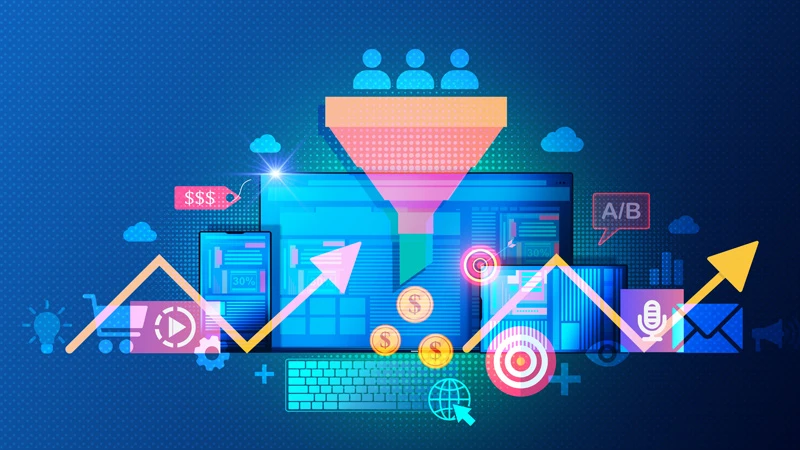Why businesses are investing Growth Systems For B2B for scalability
Change Your Business: Just How AI Automation Is Transforming B2B Workflow
AI automation is improving B2B operations in considerable ways. Business are embracing this innovation to streamline process and enhance effectiveness. As tasks end up being automated, businesses can concentrate on calculated development as opposed to ordinary processes. The implications of these modifications are extensive, affecting whatever from customer communications to provide chain management. Recognizing this change is essential, as the future of company rest on the effective combination of AI right into day-to-day operations. What lies ahead in this advancing landscape?
Understanding AI Automation in B2B Context
As services significantly seek effectiveness, recognizing AI automation within the B2B context becomes important. AI automation describes the application of expert system modern technologies to enhance and simplify company procedures. In B2B environments, this can show up in different types, such as automating data access, maximizing supply chain logistics, or improving inventory management. Organizations leveraging AI automation can reduce functional prices, minimize human mistake, and rise performance. Furthermore, AI tools can evaluate large amounts of data to offer actionable insights, enabling informed decision-making. Growth Systems For B2B. The combination of AI right into B2B procedures not only transforms typical process yet also promotes dexterity and scalability, permitting services to adjust to market changes quickly and properly. Welcoming this innovation is crucial for staying competitive in today's digital landscape
Enhancing Consumer Experience Through AI
Just how can AI transform customer interactions in the B2B industry? AI enhances customer experience by supplying individualized, timely, and effective solution. Smart chatbots and digital aides can manage questions 24/7, ensuring clients receive immediate reactions. Growth Systems For B2B. Anticipating analytics enable companies to expect client requirements, tailoring offerings appropriately. AI-driven platforms can analyze customer data, allowing for targeted marketing strategies and improved engagement. Furthermore, belief evaluation devices analyze consumer responses, aiding organizations fine-tune their services. By automating regular jobs, AI frees up personnels to focus on high-value interactions, fostering more powerful partnerships. The combination of AI not only streamlines interaction yet likewise builds trust and commitment, eventually elevating the overall consumer experience in the competitive B2B landscape

Simplifying Supply Chain Monitoring With AI
AI plays a vital function in optimizing supply chain monitoring with predictive analytics and automated inventory control. By leveraging anticipating analytics, services can anticipate need variations and change their operations appropriately. Automated supply systems additionally enhance efficiency by making sure supply degrees are preserved, decreasing waste and improving general efficiency.
Anticipating Analytics Advantages
While several companies face difficulties in handling intricate supply chains, anticipating analytics uses a transformative remedy by leveraging vast amounts of data to forecast fads and maximize procedures. By assessing historical information together with real-time inputs, predictive analytics enables firms to determine patterns and anticipate future demands. This insight permits for more educated decision-making, enhancing efficiency and reducing expenses. In enhancement, services can proactively address possible disturbances by predicting supply chain bottlenecks and changing methods appropriately. The combination of anticipating analytics not only enhances inventory administration yet additionally fosters stronger relationships with providers and customers with prompt responses to market changes. Eventually, the fostering of predictive analytics equips organizations to remain affordable in an increasingly dynamic organization setting.
Automated Stock Control
As businesses increasingly rely upon predictive analytics to enhance supply chain procedures, automated inventory control emerges as an effective ally in this initiative. By leveraging AI-driven modern technologies, firms can boost precision in supply tracking, lower stockouts, and lessen excess inventory. Automated systems analyze real-time data, enabling services to forecast demand fluctuations and adjust supply degrees appropriately. This not just simplifies order satisfaction but also enhances capital monitoring by lowering holding expenses. Furthermore, AI can identify patterns in buying actions, enabling even more educated decision-making concerning provider relationships and procurement approaches. Ultimately, automated supply control not only improves functional efficiency but additionally improves client complete satisfaction by guaranteeing item accessibility, solidifying its role as a vital element in contemporary supply chain administration.
Data-Driven Choice Making Powered by AI
In today's competitive landscape, companies progressively depend on data-driven decision-making to boost functional effectiveness and critical planning. Man-made intelligence plays a critical duty in this transformation by assessing vast amounts of information swiftly and accurately. AI algorithms recognize patterns, patterns, and anomalies that human analysts could forget, enabling businesses to make enlightened decisions based upon real-time understandings. This capacity permits firms to predict market changes, maximize source appropriation, and tailor their offerings to client requirements. Additionally, AI-driven analytics facilitate threat evaluation and monitoring, guaranteeing that companies can browse uncertainties properly. By leveraging these sophisticated devices, businesses not just enhance their decision-making processes however additionally acquire an affordable benefit in their respective markets, promoting development and advancement.
Automating Recurring Jobs to Boost Productivity

Incorporating AI With Existing Business Processes
Lots of companies encounter challenges when blog here integrating AI with existing company procedures. These difficulties typically come from an absence of understanding concerning exactly how AI can enhance existing operations. Effective assimilation needs an extensive evaluation of existing operations to identify locations where AI can add value. Organizations must additionally guarantee that their teams are outfitted with the required abilities to take advantage of AI tools efficiently. Furthermore, seamless integration rests on the compatibility of AI innovations with legacy systems. Firms often discover it advantageous to adopt a phased approach, piloting AI applications in particular departments before a broader rollout. This approach permits for modifications based on initial responses, assuring smoother shifts and optimizing the prospective benefits of AI automation in boosting efficiency and efficiency.
Future Fads in AI Automation for B2B Firms
As B2B business look to the future, enhanced information analytics is readied to play a critical role in driving decision-making processes. Intelligent process automation will certainly also become a vital pattern, streamlining procedures and boosting effectiveness. These developments assure to reshape just how services operate, inevitably bring about even more agile and responsive organizations.
Boosted Data Analytics
While businesses significantly count on data-driven choices, the role of AI in boosting data analytics is becoming extra essential in B2B operations. AI modern technologies help with the collection and analysis of large datasets, enabling business to reveal valuable insights that drive strategic planning. Anticipating analytics powered by AI enables organizations to anticipate market fads and customer actions with better accuracy. Additionally, device knowing algorithms improve data interpretation, determining patterns that human analysts might neglect. This leads to even more informed decision-making and enhanced resource allowance - Minarik AI. As B2B companies proceed to accept AI-driven analytics, they can expect enhanced operational effectiveness, boosted consumer experiences, and an one-upmanship on the market. The future of information analytics in B2B rests on integrating innovative AI abilities
Smart Refine Automation
Smart Process Automation (IPA) is positioned to change B2B operations by seamlessly integrating AI modern technologies with traditional company procedures. This innovative technique combines robot procedure automation (RPA) with sophisticated AI abilities, enabling organizations to enhance efficiency and precision. Companies can automate repetitive tasks, such as information entry and invoice processing, allowing employees to focus on calculated efforts. IPA likewise leverages machine knowing and all-natural language handling, boosting decision-making via real-time data analysis. As organizations increasingly embrace IPA, they can anticipate considerable price reductions and improved consumer experiences. Future patterns indicate a growing reliance on IPA for scalability and adaptability, positioning companies to prosper in an ever-evolving marketplace. Embracing IPA will be essential for preserving competition in the electronic age.
Often Asked Questions
What Industries Benefit Many From AI Automation in B2B Workflow?
Production, logistics, financing, and medical care markets benefit most from AI automation in B2B operations. These markets take advantage of automation to improve effectiveness, minimize expenses, improve processes, and improve decision-making through anticipating analytics and data-driven insights.
Exactly How Can Little Services Carry Out AI Automation Efficiently?
Tiny services can carry out AI automation efficiently by identifying repetitive jobs, choosing proper devices, incorporating services gradually, educating personnel, and continuously examining efficiency to maximize processes, ensuring a smooth changeover and making the most of efficiency. AI Automation For B2B.
What Are the Prices Connected With AI Automation Application?
The costs related to AI automation application usually include software program acquisition, framework upgrades, training team, ongoing upkeep, and prospective appointment charges. These costs can vary significantly based on the range and complexity of the automation solutions picked.
Just how Do I Determine ROI From AI Automation Initiatives?
To determine ROI from AI automation campaigns, one ought to assess cost financial savings, productivity enhancements, and earnings growth against application prices. Tracking key performance indicators gradually gives valuable insights into efficiency and general return on investment.
What Skills Are Required to Take Care Of AI Automation Projects?
Reliable management of AI automation projects calls for skills in job administration, data analysis, programs, and comprehending AI technologies. Furthermore, solid interaction, analytical abilities, and adaptability are important for navigating the complexities of such efforts.
As organizations progressively look for effectiveness, comprehending AI automation within the B2B context ends up being crucial. The combination of AI into B2B operations not only changes conventional workflows but also promotes dexterity and scalability, permitting companies to adapt to market modifications quickly and effectively. While businesses increasingly count on data-driven choices, the role of AI in enhancing information analytics is coming to be a lot more crucial in B2B procedures. Smart Refine Automation (IPA) is positioned to reinvent B2B operations by perfectly integrating AI technologies with conventional organization processes. Efficient management of AI automation projects calls for abilities in task management, information analysis, programming, and understanding AI innovations.